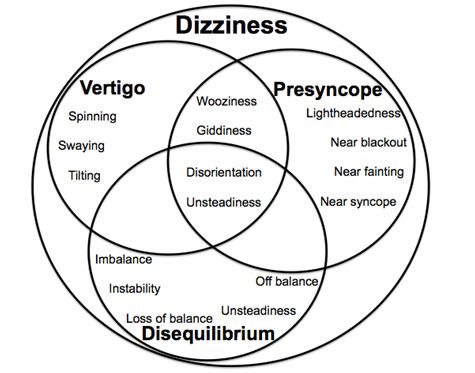Definitions
Vertigo
Vertigo is the hallucination of motion. It derives from the French verb “yertere”, which means to turn. Vestibular disorders, which are slow, such as arteriosclerosis changes. Or slow growing tumours such as acoustic neuroma, may cause a vestibulopathy (caloric weakness) but without vertigo. This is most likely a result of compensation where the brain accommodates this asymmetry because it occurs over a long period of time.
The hallucination of motion is heightened by the sensory conflict. While the vestibular systems message to the brain is that the head is turning quickly m one direction, the visual and somatosensory systems cannot corroborate that signal. So, vertigo could be described as the brain’s conscious reaction to sensory conflict. Vertigo is generally a sensation of any derangement of vestibular system, peripheral or central.
Dizziness
Dizziness is the feeling of being lightheaded, woozy, or unbalanced. It affects the sensory organs, specifically the eyes and ears, so it can sometimes cause fainting. Dizziness isn’t a disease, but rather a symptom of various disorders.
Balance
Balance is the ability to maintain the body’s center of mass over its base of support.1A properly functioning balance system allows humans to see clearly while moving, identify orientation with respect to gravity, determine direction and speed of movement, and make automatic postural adjustments to maintain posture and stability in various conditions and activities.
Balance is achieved and maintained by a complex set of sensorimotor control systems that include sensory input from vision (sight), proprioception (touch), and the vestibular system (motion, equilibrium, spatial orientation); integration of that sensory input; and motor output to the eye and body muscles. Injury, disease, certain drugs, or the aging process can affect one or more of these components. In addition to the contribution of sensory information, there may also be psychological factors that impair our sense of balance.
Equilibrium
- Condition in which all the forces acting on the body are balanced such that the (center of Gravity) COG is controlled relative to (base of support) BOS.
- An individual’s ability to maintain their COG over their BOS in a given sensory environment.
- Skill the CNS learns to accomplish using multiple interacting system, including passive biomechanical elements, all available sensory systems and muscles, and many different parts of the brain. Equilibrium control is quite proactive , adaptive and centrally based upon prior experience and intension. (Horak, Henry, and Shumway-Cook).
Vertigo and disequilibrium may cause a feeling of dizziness, but those two terms describe different symptoms. Vertigois characterized by a spinning sensation, like the room is moving. It may also feel like motion sickness or as if you’re leaning to one side. Disequilibrium is a loss of balance or equilibrium. True dizziness is the feeling of lightheadedness or nearly fainting.
Dizziness is common and its underlying cause usually isn’t serious. Occasional dizziness is not something to worry about. However, you should call your doctor immediately if you’re experiencing repeated episodes of dizziness for no apparent reason or for a prolonged period.
Dizziness is a broad term used to explain how we feel when our sense of balance is not quite right. The term encompasses a variety of sensations that can mean different things to different people. If you have ever been dizzy, you may have found it difficult to describe exactly how it made you feel. Some people who report feeling dizzy say they feel as if everything is spinning around them, or as if they are spinning or turning themselves. This is what doctors usually mean when they refer to vertigo. Others describe feeling wobbly or unsteady as if they were on a boat. And still others may describe their dizziness as a feeling of “floating”, lightheadedness or “giddiness”.



